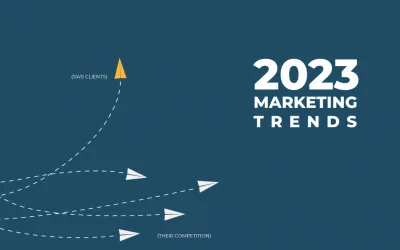With Mark Zuckerberg’s recent announcement surrounding Facebook’s name change to Meta, many business owners are rightfully wondering what exactly this means for the future of their operations. The new name signifies the parent company which acts as an umbrella over Facebook, Instagram, WhatsApp, and Oculus, as well as a larger move toward building the “metaverse.”
But what exactly is this metaverse, when will it arrive, and how will it impact small business owners? While many of these details have yet to be worked out, there are some inferences that we can make based on the information that is available that can help early adopters thrive in the ever-changing digital landscape.

What Exactly is a Metaverse?
While Mark Zuckerberg’s announcement came on October 28, 2021, conversations surrounding the “metaverse” started as early as 1992 in Neal Stephenson’s science fiction novel, “Snow Crash.” In this book, the author told of lifelike digital avatars that connected in realistic yet completely virtual environments. Thirty years later, this science fiction novel is slowly but surely taking shape before our eyes as Meta’s group of companies work together to transform the digital world.
As Matthew Ball, managing partner of venture capital firm Epyllion Industries, puts it, “… we are on the cusp of the next internet.” Meta is what many supporters envision will be the very place where users work, play, and even experience the world. By combining virtual and augmented reality technologies with the power of social media and communications, users could experience everything from virtual concerts to trips around the world.
A metaverse is a digital world where users can interact as avatars or digital representations of themselves. In a metaverse, a user’s avatar can buy clothes, property, artwork, and even create online businesses.
When Will the Metaverse Arrive?
There are actually a few decentralized metaverses already, the two most popular being Sandbox and Decentraland. These metaverses are growing in popularity as more and more users are joining everyday.
Details surrounding the Facebook metaverse’s official arrival remain vague, but Zuckerberg predicts that it could take up to 10 years before the key components of the metaverse are widely adopted. However, many aspects of the metaverse are already alive and well today. And, with so many users of Facebook’s platform already, it’s easy to envision rapid, widespread adoption of any technologies within the group of companies that are seamlessly integrated through easily accessible devices.
While these other two metaverses have a a decent user base, Facebook’s massive user base is definitely going to be helpful in gaining widespread adoption. With over 2.6 billion active monthly users on Facebook worldwide, being able to tap into this user base is a big advantage in making Facebook’s metaverse THE metaverse.
By comparison, decentralized metaverses like Decentraland and Sandbox only boast a combined monthly user base of 330,000. If Facebook users are any indication of Meta’s ultimate success, we could very well be looking at something like the “next internet.”
How Will Facebook’s Metaverse Impact Businesses?
Not much is known about the metaverse yet, but what we do know from previous iterations of technologies and platform releases like this can allow businesses to better prepare for the potential impact.
Early Adopters will profit
As we mentioned, Facebook already has a strong user base. If your business isn’t on the platform already, it could run the risk of becoming obsolete as this audience grows stronger. Early adopters benefit regardless of what the new platform may be, and being able to learn the platform and use it to your company’s advantage will be critical to achieving success — whatever the change may entail. Create a profile for your business early to learn the systems and algorithms so you can remain competitive in the digital space.
New ways to Reach Audiences
Perhaps the most significant impact that businesses will experience is the ability to reach new audiences in new ways. The metaverse aims to be an all-encompassing, completely open platform that people can use to interact with one another virtually, as though they were in real life. Through Facebook’s acquisition of Oculus in 2014, Meta hopes to one day create the virtual world in which digital avatars connect to work, travel, and be entertained using VR headsets — not unlike Stephenson’s 1992 novel. Developments such as these create new and exciting opportunities for businesses to reach their target audience.
Digital Assets will rule the metaverse
Along with the metaverse, we’re likely to see major shifts in the digital marketplace. Chief among these changes are non-fungible tokens (NFTs). In the digital world, NFTs prove certification of original ownership of a virtual asset. Aside from common NFTs like images, pdfs, and videos, non-fungible assets can also take the form of contracts, business assets, and digital assets. Identifying opportunities to leverage NFTs in your business transactions will certainly give you a leg up in the impending metaverse.
In terms of financial assets, companies need to think about how their customers will transact in the metaverse. As more experiences and services work to include virtual accommodations, businesses will need to think about ways in which they can accept digital wallets and cryptocurrency.
Identify ways to “Digitize” Business
Again, the goal of the metaverse is essentially to create opportunities for people to experience their world through the digital sphere. Businesses that work harder to sell their goods and services online will experience the highest degree of success. Think about how you can interact with your clients digitally. For instance, it’s possible that a commercial painter might hire a digital artist to create renderings for digital properties created in the metaverse. The possibilities are endless, which means the most creative minds ultimately be the ones to win over their clients and customers.
Where Will Facebook Meta Take Business?
Right now, a lot remains to be seen about the impact that Meta will have on business operations. However, one thing is for sure: The metaverse signifies a larger movement into a more robust, comprehensive, and exciting internet experience, regardless of whether it’s powered by Facebook or not. By preparing for the change now, you’ll be able to remain competitive and connected in the new digital world.




